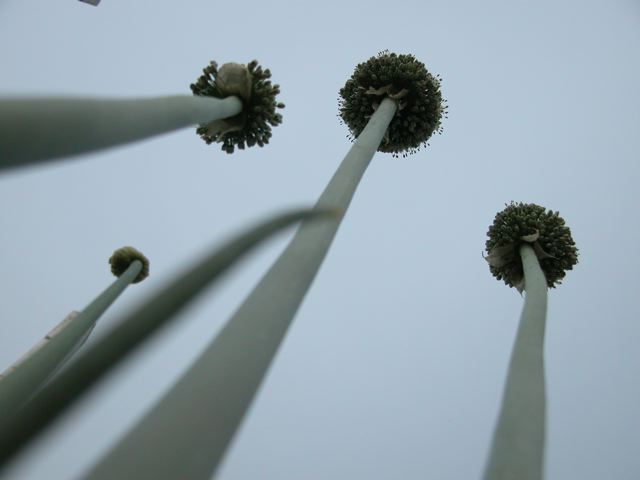
Not much I can do here
It's January, and it seems I can rant just fine about food production. It's January, and we're finally snow-covered, so I can't do much outside. I do my gardening now mostly with pages: in my notebooks, in books, on the Web. So I was reading here recently about putting more "fun" into your veg garden this year. Well, I think gardening IS fun, 95% of the time, but I understand how people can distracted, or even discouraged, in the edibles department: there's a lot of work involved, for sometimes very little payoff.
I thought about my (fun) plans for this year's garden, and the one new-to-me item I have ordered is sea kale. Now, this is an interesting factoid. I have consumed nearly every American publication on vegetable production...or so it would seem, between my sagging bookshelves and my worn-out library card. Either every book has the same information (and package the info. differently), or there really isn't much that is new(s) to me, U.S.-garden-wise. It's when I stumble across non-American books that my learning really climbs (or my ignorance does; your choice). Thus, the sea kale, a vegetable I didn't know. I found it in one of my all-time fave organic books. It's British.
In it I have learned many little semantic differences between the U.S. veg garden and one found in the U.K. (You'd expect this, especially if you've ever traveled there, especially in the company of a guy named Randy...but I digress.) But it goes further. They call something purple "broccoli" and something green "calabrese," whereas we certainly don't have the purple stuff growing in OUR gardens. There's a boatload of other cultural (literally: soil culture on up) differences that I have gleaned from this, and other, books from the U.K.
But it really has me thinking. If I've learned as much as I have from one garden book from a country so similar to my own, I can only imagine what I would learn from a book from China, with its 4,000+ year old gardens. Or Peru, with their ancient terraces of potatoes. Or all the squashes and gourds in Africa. Or Iraq and Iran, the site of the Fertile Crescent, and 11,000 years of cultivation.
And somehow I am not so smug about what I know, for I know nothing!
But just think about all the new veggies I could get for my garden....


6 comments:
I love it when I get a hold of British gardening books too! To bad we couldn't get more of them.
Monica
What does one do with sea-kale? I guess it doesn't need some type of saline environment? The pictures show it on beaches and marine type habitats. Can you just grow it in your garden? Its exciting. I'm overwhelmed by the variety in this country. I would be immobilized if I started looking at Chinese offerings. Imagine the seed catalogs though!
Meredith you need to check out Kitazawa seeds! YUM CHINESE BROCCOLI YUM YUM YUM (can just imagine the stirfry now) Look in the sidebar of this site for a link. I guess sea kale likes, or rather does, grow while covered with saltspray, but then, so do beets without much problem. You can blanch it. You eat the shoots. It's all new to me. And hopefully I will still be finding new things to grow 30 years from now!! And Monica, I am a big believer in secondhand books, which is where I got these. Oh, and the Amazon UK site helps, too...
The one that I just learned is that Italians call wheat "corn." I understand that Europe calls corn "maize" but it is quite confusing when you're a clueless American.
How about Giant Walking Stick Kale?
Grows like a giant cane, with leaves on top. Of course, grown in the Channel Islands for 2 centuries as a tourist novelty. Are seeds from foreign catalogs not allowed in the US? I assume you can access catalogs on line.
Hey Anonymous
I'm a huge kale fan, and my lacinato kale actually looks like walking sticks now...but I believe the USDA puts a lot of restrictions on seed imports here. I know of people who've smuggled fingerling potatoes in their luggage from Switzerland, at least. I *think* there are restrictions, that is...does anyone else know?
And Laurie: it took me about forever to realize that what Brits etc. call "broad beans" are actually fava beans. Here I am thinking they're some kind of romano bean.
Post a Comment